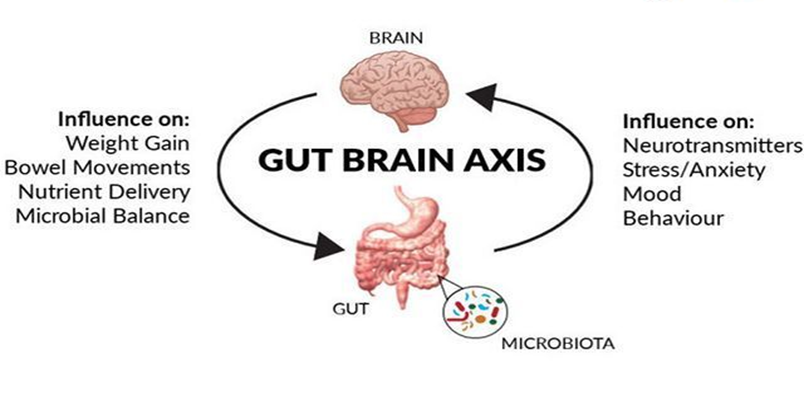HOW TO IMPROVE OUR GUT HEALTH?
Imagine
waking up every morning feeling energized, focused, and ready to take on the
day. Imagine having a robust immune system, glowing skin, and a mind that's
clear and sharp. It all starts with your gut.
GUT-BRAIN CONNECTION:
Your
gut and brain are connected through the gut-brain axis, a powerful
communication network that allows them to exchange information which is called
Gut-Brain Connection. This means that a healthy gut microbiome is essential
for:
- A strong immune
system that fights off diseases.
- Efficient digestion
and nutrient absorption for optimal energy.
- Mental clarity and
focus to tackle your daily tasks.
- A balanced mood and
emotional well-being.
WAYS TO SUPER-CHARGE YOUR GUT HEALTH:
1. Eat a Rainbow:
The idea of "eating a rainbow" goes beyond just making your plate visually appealing. A variety of fruits and vegetables in different colours provides a rich array of antioxidants, vitamins, minerals, and fibre that promote a healthy gut. The different colours represent different types of phytonutrients, each with its unique health benefits.
For instance, red foods like tomatoes and strawberries are rich in lycopene, a powerful antioxidant that can reduce inflammation. Green vegetables like spinach and kale are packed with vitamins A, C, and K, which support immune function and aid digestion. Purple foods like eggplant and blueberries contain anthocyanins, which help protect your gut lining.
2. Get Your Ferment On:
Fermented foods are loaded with probiotics—live beneficial bacteria that can help populate your gut with good microbes. These foods aid digestion, improve immune function, and contribute to a balanced microbiome.
Fermented foods such as kimchi, sauerkraut, and yogurt contain lactic acid bacteria (LAB) that promote the growth of beneficial bacteria in your gut. These probiotics help break down food more efficiently, reducing bloating and improving nutrient absorption.
3. Hydrate, Hydrate, Hydrate:
Drinking plenty of water throughout the day is essential for maintaining a healthy gut and digestive system. Hydration supports the production of mucus, which is crucial for protecting the gut lining from damage.
Water helps soften stool, making bowel movements regular and preventing constipation. It also helps break down food, allowing nutrients to be absorbed more effectively.
4. Move Your Body:
Exercise isn’t just good for your muscles; it’s great for your gut, too. Regular physical activity helps improve gut motility, reduce inflammation, and boost the growth of beneficial bacteria.
Exercise promotes intestinal peristalsis (the contraction of muscles in the digestive tract) to help food move through the system. It also enhances blood flow to the digestive organs and reduces stress, which can have a negative impact on gut health.
5. Find Your Inner Calm:
Chronic stress is one of the biggest contributors to digestive issues like bloating, acid reflux, and IBS. High stress levels can negatively impact the gut-brain connection, disrupting the balance of good and bad bacteria in your microbiome.
Techniques such as meditation, yoga, and deep breathing exercises activate the parasympathetic nervous system (the "rest and digest" state), helping to reduce stress hormones and inflammation. These practices also promote relaxation in the digestive system, leading to better digestion and absorption of nutrients.
6. Get Your Beauty Sleep:
Sleep plays a crucial role in maintaining a healthy gut microbiome. Lack of sleep can lead to disruptions in the gut’s microbial balance, causing an increase in harmful bacteria and a decrease in beneficial ones.
During sleep, your body repairs and regenerates cells, including those in the gut lining. 7-8 hours of quality sleep each night helps regulate gut microbiome diversity, promotes better digestion, and supports immune function.
7. Ditch the Junk:
Processed foods that are high in sugars, unhealthy fats, and artificial additives can wreak havoc on your gut microbiome, promoting the growth of harmful bacteria and reducing microbial diversity.
These foods can create an imbalance in the gut, leading to inflammation and digestive issues like bloating, gas, and discomfort. High sugar intake, in particular, can fuel harmful bacteria, while excess fat can lead to intestinal permeability (leaky gut).
8. Probiotics to the Rescue:
Probiotic supplements are a popular way to support gut health. They contain live beneficial bacteria that help replenish and maintain a healthy balance of gut flora, which is essential for proper digestion and immune function.
Probiotics can help restore the balance of good bacteria in the gut, particularly after a course of antibiotics or during times of stress. They can improve symptoms of IBS, bloating, and constipation, while also supporting immune health.
9. Omega-3s for the Win:
Omega-3 fatty acids, found in foods like fatty fish, walnuts, flaxseeds, and chia seeds, have powerful anti-inflammatory properties that can benefit gut health.
Omega-3s help reduce inflammation in the gut and promote a healthy microbiome. They also support the gut lining, which acts as a barrier to harmful pathogens and toxins.
10. Antibiotics:Antibiotics are often necessary for treating bacterial infections, but overuse or unnecessary use of antibiotics can disrupt your gut microbiome, killing off both harmful and beneficial bacteria.
Antibiotics can create an imbalance in the gut by depleting the number of good bacteria and allowing harmful bacteria to proliferate. This disruption can lead to issues like diarrhoea, yeast infections, and gut dysbiosis (microbial imbalance).
CONCLUSION:
Taking care of your gut is essential for overall well-being, as it impacts digestion, immune function, mental clarity, and much more. By making small yet meaningful changes to your lifestyle—such as eating a rainbow of fruits and vegetables, staying hydrated, managing stress, and incorporating fermented foods into your diet—you can support a healthy gut microbiome and enjoy improved health and vitality.
Remember, it's not about perfection; it’s about making consistent, mindful choices that nourish your body from the inside out. By focusing on a balanced approach, you’ll empower your gut to work in harmony with your body, helping you feel your best every day. Your gut deserves the care, and with these simple steps, you can give it the love it needs to thrive.



.jpeg)
Comments
Post a Comment